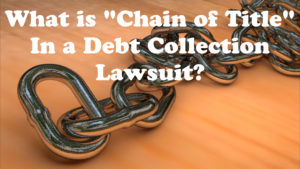By: Robert J. Nahoum
Consumers sued in debt collection cases often find themselves up against companies they have never heard of. Names like Midland Funding, LVNV Funding, CACH LLC, New Century Financial Services, Portfolio Recovery Associates, Unifund and Calvary Portfolio Services. The reason you’ve never heard of these companies is because, while you’ve never done business with them, they’re doing business with someone who knows you.
There is an industry out there waiting in the shadows of traditional banks and credit card companies to buy up, for pennies on the dollar, portfolios of old debt. These bottom feeders are called debt buyers and they make boat loads of money collecting long forgotten consumer debts.
The difference between an “original creditor†who first extended you the credit and a debt buyer is important because there are different rules that apply. Federal debt collection laws known as the Fair Debt Collection Practices Act (FDCPA for short), regulates the conduct of third party debt collectors like debt buyers. Debt collectors subject to the FDCPA must not use false, misleading or harassing debt collection tactics. Original creditors are generally not subject to these restrictions. If a debt collector violates the FDCPA, you can sue for damages up to $1,000.00 plus actual damages (like pain and suffering) and your attorney’s fees.
To prove that a debt buyer owns your debt, it generally must prove how it came to acquire it. The sale of a debt from one creditor to another is memorialized through an “assignment†in which the original creditor “assigns†ownership (and the right to collect the debt) to a new creditor. To be valid, the assignment must sufficiently identify your particular debt.
Often, debts are sold and resold over and over again to a number of subsequent debt buyers. When this happens, the debt buyer must prove each and every assignment by showing a “chain of title†reaching all the way back in history to the original creditor. Again, each assignment must sufficiently identify your particular debt.
If you need help settling or defending a debt collection law suit, stopping harassing debt collectors or suing a debt collector, contact us today to see what we can do for you.
The Law Offices of Robert J. Nahoum, P.C
(845) 232-0202
www.nahoumlaw.com
info@nahoumlaw.com

